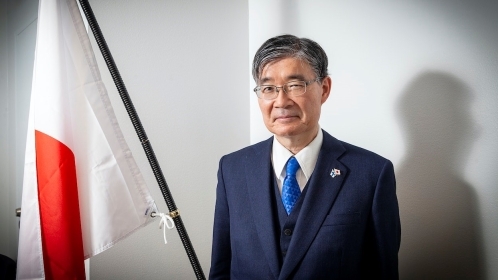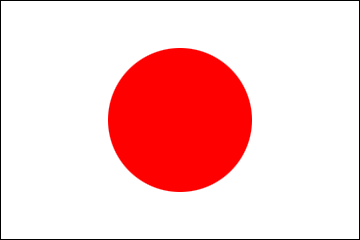Maaseudun Tulevaisuus紙のインタビュー
令和5年3月3日
Maaseudun Tulevaisuus 1.3.2023
https://www.maaseuduntulevaisuus.fi/uutiset/c68fa212-3464-4a68-8a9f-134e2711f2f0
These three things unite Japan and Finland, says the ambassador - "I have noticed the same trait in Finns"

Japan's Ambassador to Finland, Kazuhiro Fujimura, came to Finland for the first time last spring, but he can already explain the similarities between our mentalities. Photo: Kari Salonen
Physically so far, but mentally close. The ambassador tells his observations about the similarities between the Japanese and Finns.
Moomins, greenery, wood construction, silence.
Finns and Japanese seem to be united by a similar, perhaps even a little simple, mental landscape. What could be the cause?
Ambassador Kazuhiro Fujimura responds.
"One is trust. It is important for Japanese and Finns, in relation to ourselves, each other and our countries. More and more attention is paid to trust."
The second is love: a deep attachment to peace and harmony, including respect for other people.
"A Japanese person, for example, listens to what the other person wants to say without interrupting. I have noticed the same trait in Finns. They also listen patiently to what I'm trying to say."
The third common feature is a love of nature.
"We both have abundant nature and the opportunity to live a spiritually rich life. It is different from material wealth.”
Maaseudun Tulevaisuus 2.3.2023
https://www.maaseuduntulevaisuus.fi/uutiset/ce8d2d1e-63cb-4892-a55c-96271e41ead0
Japan invests in its defense at a record level: "The situation is more serious than at any time since the Second World War"
In December, Japan became the ninth user country of Patria's AMV vehicles, when it selected the Patria AMVXP 8x8 as the next armored personnel carrier for its ground forces. The vehicles are manufactured in Japan under license. Kuva: Patria.
Japan's military ties to Europe are strong, as the country is also developing a new fighter aircraft with Italy and Britain.
The international community and the world order are now facing very serious challenges and relations have become complicated, says Japan's Ambassador to Finland, Kazuhiro Fujimura.
"Japan's security environment is in a more serious situation than at any time since World War II."
The Japanese government characterizes the present moment as a turning point in history. The international order based on openness and law is shaking because the balance of power and geopolitical competition is changing.
Japan doesn't have an actual army, but self-defense forces. They will be equipped with a record 300 billion euros over the next 5 years.
There is no fear of war, but the country wants to protect the people, and the government renewed its security strategy at the end of the year. Japan is using the money to improve its defense and counterattack capabilities.
The defense budget will grow to the same as that of the NATO countries, i.e. to two percent of the gross domestic product by 2027.
Just before the corona pandemic, Finland and Japan signed a defense cooperation document, which extends from high-level meetings to the exchange of troops.
"Cooperation started only after the pandemic. Last year, Japan chose Patria AMV 8X8 as its next armored vehicle supplier."
At the end of the year, it was reported that Japan, Italy and Britain will join forces in the development of a new fighter aircraft. The country's ties to Europe are therefore strong.
"Cooperation is important because we think that we can no longer talk about European security without the Indo-Pacific region."
The Indo-Pacific region refers to the countries on the shores of the Indian and Pacific Oceans. Japan talks about the FOIP (Free and Open Indo-Pacific) policy, and the EU and many European countries also have their own Indo-Pacific policies.
Russia is separated from Japan by only a few tens of kilometers wide straits to the Sakhalin Peninsula and the Kunashiri Island. Russia has threatened the territories during the war in Ukraine.
"Russia has increased its military activity near us and promoted its strategic coordination with China," Fujimura says, mentioning their naval and air combat exercises near Japan.
Last summer, Chinese missiles hit Japan's territorial waters, which strained the relationship between the two countries.
"China's military activity has increased in the South and East China Seas, and it is causing growing concern in Japan and also internationally. It is undeniable that both China and Japan have a significant responsibility for the peace and prosperity of the region and the entire world, and common rules are needed for that."
Japan has also tried to get an answer from Russia about its military actions, but that has not been received.
According to Fujimura, the relationship between Japan and China is "in a phase" towards more stable times. Japan hopes for peace in the direction of Taiwan and that dialogue and constructive cooperation will continue. For example, Covid-19 and climate change will not be solved on their own.
"Of course, China and Japan have difficult issues, but there are also huge opportunities for cooperation in terms of, for example, the environment and interaction with people."
According to Japan, the biggest keys to a solution to the tense world situation lie above all with the president of China.
https://www.maaseuduntulevaisuus.fi/uutiset/c68fa212-3464-4a68-8a9f-134e2711f2f0
These three things unite Japan and Finland, says the ambassador - "I have noticed the same trait in Finns"

Japan's Ambassador to Finland, Kazuhiro Fujimura, came to Finland for the first time last spring, but he can already explain the similarities between our mentalities. Photo: Kari Salonen
Physically so far, but mentally close. The ambassador tells his observations about the similarities between the Japanese and Finns.
Moomins, greenery, wood construction, silence.
Finns and Japanese seem to be united by a similar, perhaps even a little simple, mental landscape. What could be the cause?
Ambassador Kazuhiro Fujimura responds.
"One is trust. It is important for Japanese and Finns, in relation to ourselves, each other and our countries. More and more attention is paid to trust."
The second is love: a deep attachment to peace and harmony, including respect for other people.
"A Japanese person, for example, listens to what the other person wants to say without interrupting. I have noticed the same trait in Finns. They also listen patiently to what I'm trying to say."
The third common feature is a love of nature.
"We both have abundant nature and the opportunity to live a spiritually rich life. It is different from material wealth.”
Maaseudun Tulevaisuus 2.3.2023
https://www.maaseuduntulevaisuus.fi/uutiset/ce8d2d1e-63cb-4892-a55c-96271e41ead0
Japan invests in its defense at a record level: "The situation is more serious than at any time since the Second World War"
In December, Japan became the ninth user country of Patria's AMV vehicles, when it selected the Patria AMVXP 8x8 as the next armored personnel carrier for its ground forces. The vehicles are manufactured in Japan under license. Kuva: Patria.
Japan's military ties to Europe are strong, as the country is also developing a new fighter aircraft with Italy and Britain.
The international community and the world order are now facing very serious challenges and relations have become complicated, says Japan's Ambassador to Finland, Kazuhiro Fujimura.
"Japan's security environment is in a more serious situation than at any time since World War II."
The Japanese government characterizes the present moment as a turning point in history. The international order based on openness and law is shaking because the balance of power and geopolitical competition is changing.
Japan doesn't have an actual army, but self-defense forces. They will be equipped with a record 300 billion euros over the next 5 years.
There is no fear of war, but the country wants to protect the people, and the government renewed its security strategy at the end of the year. Japan is using the money to improve its defense and counterattack capabilities.
The defense budget will grow to the same as that of the NATO countries, i.e. to two percent of the gross domestic product by 2027.
Just before the corona pandemic, Finland and Japan signed a defense cooperation document, which extends from high-level meetings to the exchange of troops.
"Cooperation started only after the pandemic. Last year, Japan chose Patria AMV 8X8 as its next armored vehicle supplier."
At the end of the year, it was reported that Japan, Italy and Britain will join forces in the development of a new fighter aircraft. The country's ties to Europe are therefore strong.
"Cooperation is important because we think that we can no longer talk about European security without the Indo-Pacific region."
The Indo-Pacific region refers to the countries on the shores of the Indian and Pacific Oceans. Japan talks about the FOIP (Free and Open Indo-Pacific) policy, and the EU and many European countries also have their own Indo-Pacific policies.
Russia is separated from Japan by only a few tens of kilometers wide straits to the Sakhalin Peninsula and the Kunashiri Island. Russia has threatened the territories during the war in Ukraine.
"Russia has increased its military activity near us and promoted its strategic coordination with China," Fujimura says, mentioning their naval and air combat exercises near Japan.
Last summer, Chinese missiles hit Japan's territorial waters, which strained the relationship between the two countries.
"China's military activity has increased in the South and East China Seas, and it is causing growing concern in Japan and also internationally. It is undeniable that both China and Japan have a significant responsibility for the peace and prosperity of the region and the entire world, and common rules are needed for that."
Japan has also tried to get an answer from Russia about its military actions, but that has not been received.
According to Fujimura, the relationship between Japan and China is "in a phase" towards more stable times. Japan hopes for peace in the direction of Taiwan and that dialogue and constructive cooperation will continue. For example, Covid-19 and climate change will not be solved on their own.
"Of course, China and Japan have difficult issues, but there are also huge opportunities for cooperation in terms of, for example, the environment and interaction with people."
According to Japan, the biggest keys to a solution to the tense world situation lie above all with the president of China.
